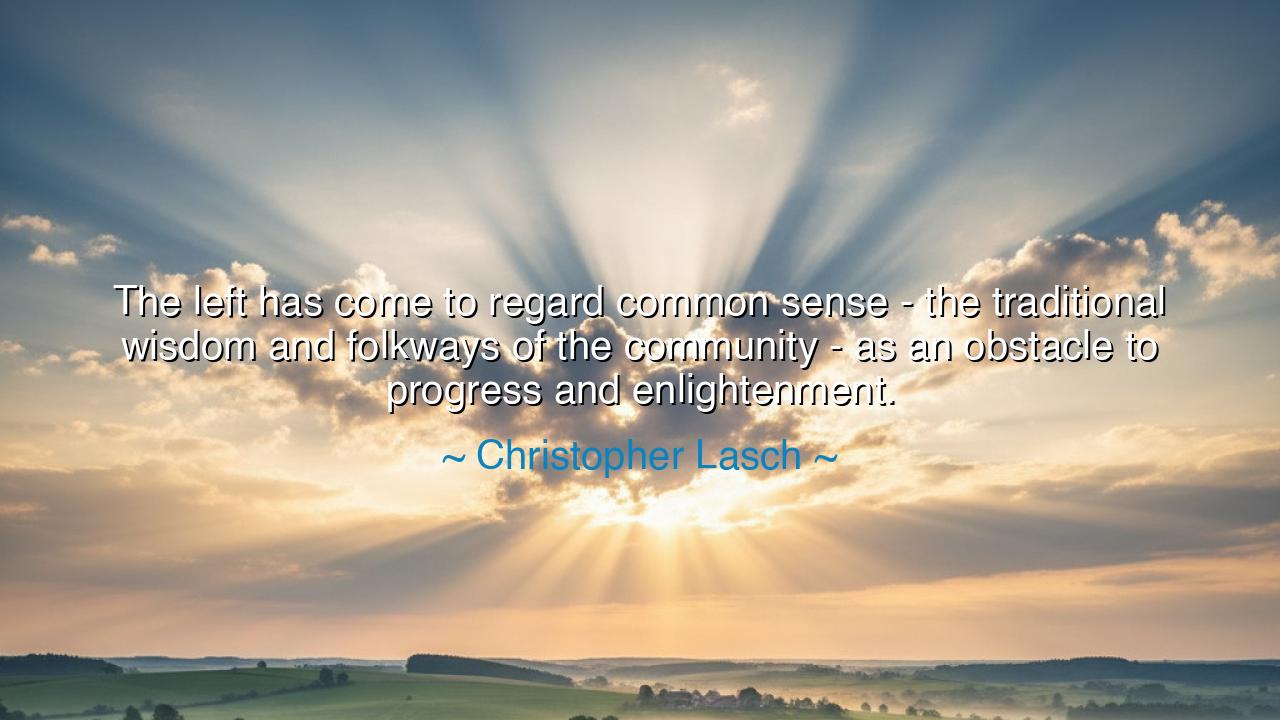
The left has come to regard common sense - the traditional
The left has come to regard common sense - the traditional wisdom and folkways of the community - as an obstacle to progress and enlightenment.






Listen, O children of the future, for I speak to you of the battle between the wisdom of the ages and the winds of change that seek to blow through our communities. Christopher Lasch, in his sharp understanding of the currents of society, declared: "The left has come to regard common sense—the traditional wisdom and folkways of the community—as an obstacle to progress and enlightenment." This is a truth both ancient and modern, for throughout history, there have been those who sought to discard the lessons of the past, believing that the new must always stand apart from the old. But wisdom, my children, is not the enemy of progress—it is its foundation.
In the ancient world, common sense was not simply a collection of habits or traditions, but the accumulated knowledge of the people, passed down through generations. Consider the philosophers of Greece, such as Plato and Aristotle, who believed that wisdom was rooted not in abstract theories, but in the realities of life and the shared experiences of the community. They understood that true progress could not be achieved by discarding the values that had long sustained the people. Instead, it was through honoring those traditions, through reflecting on them and adapting them to new circumstances, that one could build a just and flourishing society.
Yet, as Lasch points out, the left has, in many ways, turned its gaze away from this wisdom, seeking instead a progress that often disregards the common sense that binds communities together. Think of the French Revolution, when the fires of liberty and equality burned so brightly that they consumed not only the old regime but the traditional values that had held society in balance. In the name of enlightenment, many of the guiding principles of human society were cast aside, leading to chaos rather than order. The revolutionaries sought to remake the world according to their vision—but they ignored the wisdom of the past, and in doing so, created a void that was filled with violence and upheaval.
Similarly, in our own time, we see a trend toward progress that dismisses the wisdom of previous generations. The belief that the past must be discarded to make room for the new can lead us to lose sight of the principles that have guided humanity through countless struggles. There is a danger in this, O children, for to disregard common sense is to sever the roots of society. It is like a tree that, in its thirst for growth, cuts itself off from the very soil that nourishes it. Without the strength of tradition, without the stability of community, true progress becomes but a fleeting mirage.
And yet, let us not fall into the trap of blind conservatism, clinging to the past without understanding its true value. The wisdom of the community must evolve, but it should not be discarded in the pursuit of change. Consider the example of Mahatma Gandhi, who led India to freedom not by rejecting all of the past, but by drawing upon its deepest truths. He understood that true progress could not be built on the ruins of tradition, but on the strength of what was truly valuable in the ancient ways. He did not seek to destroy the old, but to transform it, to make it relevant to the world of his time.
So, O children of the future, remember this: the wisdom of the past is not an obstacle, but a foundation upon which true progress is built. It is the common sense of the people that connects us to the earth, to each other, and to the lessons of those who walked before us. Let us seek progress not by abandoning our roots, but by honoring them, adapting them, and carrying them forward into the future. In this way, we will create a society that is both wise and enlightened, grounded in the truths that have stood the test of time.






MNMinh Ngoc
This statement provokes reflection on the dynamics of cultural authority. Does the critique imply that leftist ideologies inherently undervalue lived experience, or is it more a warning against rigid ideological application? I also question whether the ‘traditional wisdom’ being defended is always equitable, or if some aspects of folkways may perpetuate injustice. How can society distinguish between wisdom worth preserving and customs that genuinely need reform without falling into ideological bias?
CFcity Feli
Reading this, I wonder about the implications for policymaking and social reform. If progressive movements disregard local wisdom, could that lead to unintended consequences or resistance from communities? Conversely, are there situations where adhering too strictly to tradition can prevent necessary improvements in society? I’m interested in exploring examples from history where balancing respect for folkways with progressive action has succeeded or failed, and what lessons can be drawn from them.
HTLe thi huyen tram
I find this perspective provocative but also potentially oversimplified. Does labeling all progressive initiatives as dismissive of common sense overlook the nuanced ways in which reform can incorporate traditional knowledge? How do we define what counts as ‘common sense,’ and who gets to decide whether it is valuable or obstructive? It raises questions about whether innovation and tradition must always be in conflict, or if there’s a way to harmonize the two.
MLminh Le
This quote makes me think about the tension between tradition and progress. Is it always true that leftist movements view community wisdom as an obstacle, or might some traditions genuinely hinder social development? I’m also curious about how one balances respect for cultural norms with the need for societal change. Could dismissing folkways entirely risk alienating communities or losing valuable insights embedded in local knowledge?